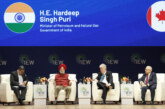Perils of Global Warming
By Dr. Arvind Kumar
.jpg) Global warming has assumed serious dimensions and the world leaders are faced with this dilemma. The ongoing buildup of human-related greenhouse gases — produced mainly by the burning of fossil fuels and forests – has attracted the attention of the scientific community which has issued serious warnings from time to time of the impending perils. According to the Global Carbon Project, an international collaboration of scientists, global emissions of carbon dioxide rose to 5.9 percent in 2010 and this increase solidified a trend of ever-rising emissions that scientists fear will make it difficult, if not impossible, to forestall severe climate change in coming decades. The process of global economic slowdown has further complicated the worldwide effort to reduce emissions in conjunction with the technological, economic and political issues that have to be resolved.
Global warming has assumed serious dimensions and the world leaders are faced with this dilemma. The ongoing buildup of human-related greenhouse gases — produced mainly by the burning of fossil fuels and forests – has attracted the attention of the scientific community which has issued serious warnings from time to time of the impending perils. According to the Global Carbon Project, an international collaboration of scientists, global emissions of carbon dioxide rose to 5.9 percent in 2010 and this increase solidified a trend of ever-rising emissions that scientists fear will make it difficult, if not impossible, to forestall severe climate change in coming decades. The process of global economic slowdown has further complicated the worldwide effort to reduce emissions in conjunction with the technological, economic and political issues that have to be resolved.The United Nations has been engaged in sponsoring global talks every year for almost two decades now, under the framework of United Nations Framework Convention on Climate Change, an international treaty signed by 194 countries to cooperatively deliberate on global climate change and its impact. The conferences on climate change, the latest being the Durban conference held in December 2011 in South Africa, have genrally veered round familiar conflicts and controversies: the differing obligations of industrialized and developing nations, the question of who will pay to help poor nations adapt, the urgency of protecting tropical forests and the need to rapidly develop and deploy clean energy technology. These meetings have often ended in disillusionment, with incremental political progress but little real impact on the climate. Unless the leading defaulters are tamed, no tangible solution to end the perils of climate change can be expected. Let’s hope that the ensuing Rio+20 conferences bear some fruitful results.



